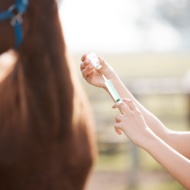Owners’ belief in horse emotion linked to animal wellbeing
Working horses are vital to communities in low and middle income countries.
A study has uncovered a link between working horse owners believing in horse emotion, and their animal having improved health and wellbeing.
The project, a collaboration between working animal charity Brooke and the University of Portsmouth, has highlighted the importance of this discovery for low and middle income countries, where the welfare of working horses is closely linked to the livelihoods of communities.
The research took place among communities in Senegal, specifically towns and villages in the Diourbel, Louga and Thiès regions. In these communities, working horses are vital to supporting the local agricultural industry.
Research from Brooke identified that, in Senegal, having a working donkey meant farmers produced 78 per cent more groundnuts, 46 per cent more maize and 44 per cent more millet.
In Burkina Faso, farmers said they’d see a 50 per cent loss in cultivated products without their equids. Equids are also used to transport water and livestock feed. Brooke says these roles mean that the health and welfare of these animals is vitally important.
To understand the relationship between people and their working equids, the researchers surveyed 299 working horse owners and their horses in the Senegalese communities.
The study found that horse owners who had stronger belief in horse sentience, and an overall positive attitude to horses, owned horses with a healthier body condition.
Owners who believed in horse’s emotions also provided appropriate nutrition and owned horses with better health and behaviour. A positive attitude towards horses was also associated with improved equine nutrition and behaviour.
Households which could afford their own needs were more likely to provide better welfare for their horse, including adequate diet, housing, and veterinary care. Larger households and those with better incomes were most likely to have a horse with good general health.
Leanne Proops, associate professor in animal behaviour and welfare at University of Portsmouth, said: “This finding is critical for organisations working to improve animal welfare, as it suggests that fostering empathy and compassion in horse owners could be a key strategy for improving the lives of working horses.”
However, researchers believe this discovery could work both ways.
Dr Proops added: "We know that people tend to protect themselves from distress by thinking that animals are not so capable of feeling emotions when they are faced with situations where animals may be suffering.
“Our hope is that these insights drive advocacy for better policies to protect working horses, encourage funding for welfare programs and raise awareness in communities about how knowledge of animal emotions can directly benefit their animals and, in turn, their own livelihoods.”
The full study can be found in the journal Plos One.
Image © Shutterstock



 Zoetis UK has apologised for a supply shortage of Equip Artervac, caused by a manufacturing issue.
Zoetis UK has apologised for a supply shortage of Equip Artervac, caused by a manufacturing issue.